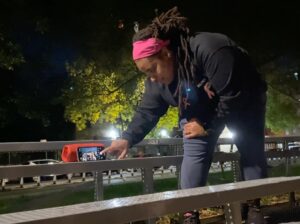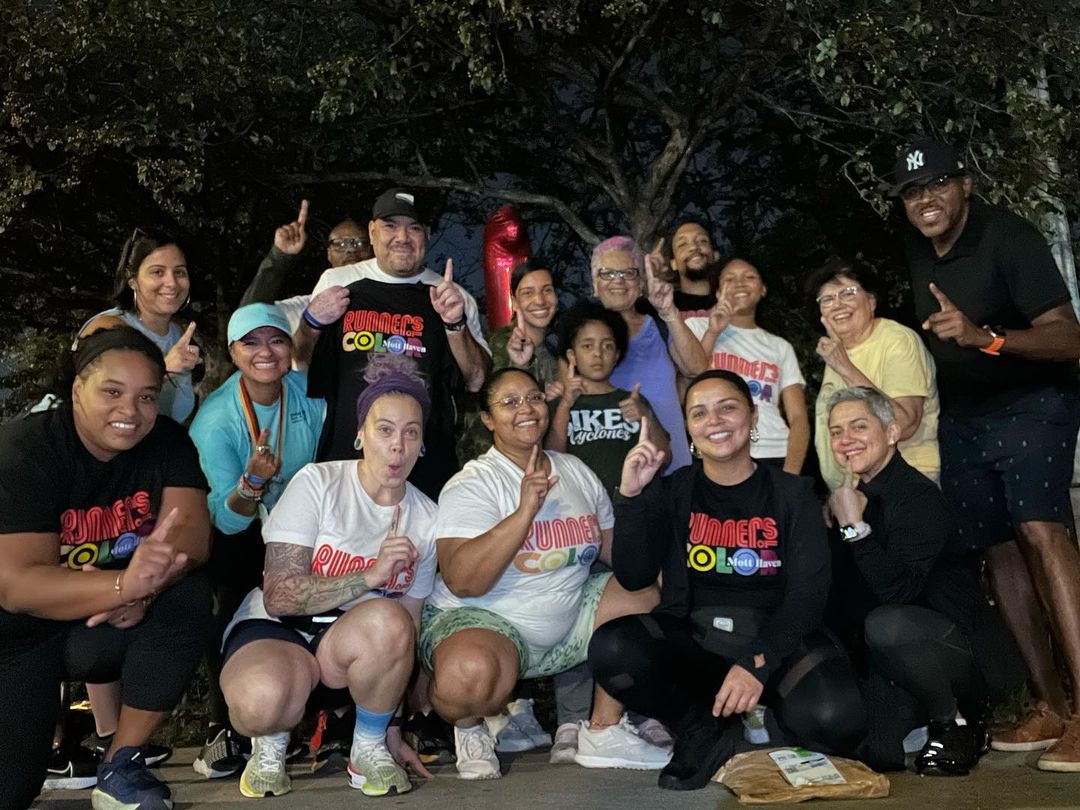(Vaya aquí para leer este articulo en español.)
An Interview with Afro-Latina activist Clarisa Alayeto.
Faced with a lack of inclusive exercise groups for people of color and based on her experience fighting diabetes, Clarisa Alayeto decided to create an initiative to improve health and keep her community in Mott Haven moving.
The number 62 became a wake-up call for Clarisa Alayeto when she learned it marked the Bronx’s position as having the lowest quality of life and health of all New York counties – a challenge that mainly affects the community of color.
It became more than a statistic – she saw it as a call to community action.
That was a year ago, when she launched the Mott Haven Runners of Color organization, so far the only running organization created by an Afro-Latina in the South Bronx. She knew that her community rarely gets involved in activities like this, and she wanted it to get healthier.
On a slightly chilly Monday night, while arranging the club poster and completing final preparations for a breast cancer awareness walk/run at St. Mary’s Park, Alayeto shared her personal experience running and the impact that Mott Haven Runners of Color has had in the community one year after its creation.
Tell me about yourself and how you started running.
I grew up here in the Mott Haven neighborhood of the South Bronx. Right now I do a lot of things in the community because I am a community organizer. But I also work in education.
And well, running was a passion of mine after many years. In 2016 I weighed three hundred pounds, they told me I had diabetes and I wanted to know how it was possible to no longer have it. Then I started running and I saw that running is good for the body, the heart, and for losing weight. I started running one block, then two blocks and in 2019 I ran my first New York City marathon.
I lost 106 pounds and no longer have diabetes. I started to think about what happened to me, and I know that in my community, there are many more people who are also going through the same thing. And I wanted to let them know that there are things we can do to change the situation.
Do you have someone or something that inspires you to run?
My health: when I feel depressed, when I feel like I have a lot on my hands, when I feel like my body doesn’t… I say ‘I’m going to go running’ because I owe it to my body, my heart and my health.’
My grandmother was always there for me to take care of my health, she always talked to me about my health and the things that were going on in the family. She worried a lot about that. And I decided to change my health before she died so that she could see that I was going to be fine. And I did it.
She was a big part of all of this. And when I was running the marathon, I was praying to her to help me so I could finish. She was a great inspiration.
What motivated you to open a running club for people of color and why open it in Mott Haven?
At Mott Haven, we know that in the Bronx we are the last in health in all of New York and my life changed by running. And I know that running as a community is a spectacular thing. Running alone is fine, but when you are running with your community, it is different.
And in many spaces there are no people of color, there are no Latinos, there are no Blacks who are running. Many of those who run are white, but running is for everyone. And I grew up in the projects here at NYCHA and we are not used to seeing people running around in the community.
So, for me it was something to bring to the community, so that people see that we are running … that we can little by little get to run a marathon.
How do you feel that your organization, which just turned one year old this year, has been able to empower the community of color again?

I believe that Mott Haven Runners of Color is a space for the community, so that they can go out and enjoy the parks, do this as a community and become more active.
People don’t realize they are exercising. You know? Walking two miles, that’s exercise. And, they are doing it with people with whom they have a good conversation and they are in nature.
So the first year was all about building a community and that’s what we continue to do now.
Mott Haven has a very large Latino community as well as a Black one. What was your process of motivating them to run?
I know that for me, running has a big impact on my mental health. And that’s the first thing I say. All of us in this community have things we are going through. We are taking care of our family, we have children, we have jobs that are stressful and running is a time for us to calm down.
There is something called ‘runners high’ and when you are running, there comes a point where you no longer realize that you are running, but it feels so good because you let go of all your bad thoughts or whatever you are going through.
That’s what running does and in our community we need spaces. Many of us do not take therapy, because of the stigma, and this somehow works as an alternative.
Speaking about sports. You said that you ran and finished the New York City Marathon. How do you feel about the inclusion of Afro-Latines in that space? Do you feel like it’s growing?
Yes absolutely. Especially in the Bronx, we have a lot of running groups now and it’s a beautiful thing. We have mile 20 in the New York City Marathon, so when you get to mile 20 which is in the Bronx, it is an electric thing that gives you a motivation that I really can’t describe.
So yes, running is growing in our community and it is a thing that is going to continue to grow and grow. And eventually, we’re going to have thousands of runners from the Bronx.
(Alayeto is not running in this year’s NYC Marathon, but Ora Kemp, a member of Mott Haven Runners of Color, is).
What would you say to someone who wants to start running but is afraid to try?
Well, there is a phrase that Martin Luther King said ‘If you can’t fly then run, if you can’t run then walk, if you can’t walk then crawl, but whatever you do you have to keep moving forward.’ And I would say, do it little by little.
Maybe you wake up and say ‘I want to run a marathon’ but it’s not going to happen overnight. It is doing a block today, running tomorrow again and little by little you put in more and more, and eventually you will see that in a year you ran. So you have to take it little by little.

